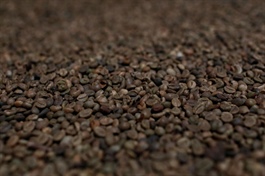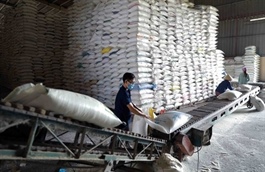Demand slumps for meat, eggs in HCM City
Demand slumps for meat, eggs in HCM City
After the long Tết holiday, sales of meat and eggs in HCM City are falling due to limited demand and changes in consumer diets for the vegetarian month.

Demand for eggs and meat in HCM City is currently low. — VNS Photo Thư |
Many carts on the streets in HCM City are currently selling poultry eggs at very low prices, only VNĐ15,000-20,000/10 eggs. Markets and supermarkets are also selling eggs at much lower prices compared to before Tết.
Vương Quang Dũng, director of Vương Huỳnh Produce Commerce and Services Company Limited, which farms egg-laying chickens in Đồng Nai Province, said that about a month before Tết, chicken eggs were priced at VNĐ1,900 per egg, but then have gradually decreased to VNĐ1,300-1,500.
The decrease in poultry egg prices is due to bakeries switching from using fresh eggs to egg powder. Additionally, early Tết holidays for factory workers and extended school closures have led to a significant decline in demand, as cafeterias for workers and students are big buyers of eggs and meat.
The remaining egg stock from before Tết has not been fully consumed, so it will take another one to two weeks for egg prices to recover.
According to egg-laying chicken farms in the Southern region, at the current price level, farmers are facing losses of about VNĐ200 per egg.
Phạm Thị Huân, Chairwoman of the Board of Directors of Ba Huân Joint Stock Company, said that poultry egg supply after Tết was very abundant.
Trương Chí Thiện, CEO of Vĩnh Thành Đạt Food Joint Stock Company (V.Food), said that egg consumption was normally low in the first month of the lunar year, so V.Food was focusing more on processing egg products.
Not only poultry eggs, but demand for pork is also declining. Nguyễn Trí Công, Chairman of the Đồng Nai Livestock Association, noted a slight increase in pork prices, but demand had decreased by about 30 per cent year-on-year.
According to the Sales Department of the Hóc Môn Wholesale Market, the amount of pork entering the market on February 20 reached 337 tonnes (approximately 4,500 pigs), which was less than the average daily amount in 2023, which was 5,700 pigs.
However, compared to the first working day after Tết (February 15), with 2,180 pigs, the amount of pigs entering the market was recovering.
Regarding chicken, Nguyễn Văn Ngọc, vice chairman of the Southeast Poultry Association, said that demand was low because this was the vegetarian month (lunar January) and also many workers had not returned to work.
This had kept industrial chicken prices at low levels, ranging from VNĐ26,000-27,000/kg, causing farmers to lose from VNĐ4,000-5,000/kg.
Farmers had reduced their flocks by about 50 per cent due to prolonged losses, but they still could not push prices up.
Ngọc said the main reason was the competition from cheap imported chicken and organs.
On the other hand, the vegetarian food market was bustling because lunar January is the time when people's demand for vegetarian food is highest in the year. After a Tết holiday full of meat and fat, people seek more balanced and light meals.
Trần Công Phương Linh, Director of Saigon Vegetarian Food Company Limited, said that the company's production had increased two to three times compared to normal due to many supermarkets and stores placing large orders.
The Co.opmart supermarket chain has also launched promotional programs with a variety of vegetarian products, including spices and processed foods.


























